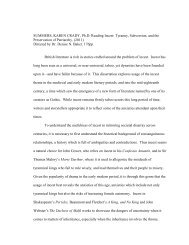CHUNG, SOONKYU, Ph. D. Mechanisms by Which Conjugated ...
CHUNG, SOONKYU, Ph. D. Mechanisms by Which Conjugated ...
CHUNG, SOONKYU, Ph. D. Mechanisms by Which Conjugated ...
Create successful ePaper yourself
Turn your PDF publications into a flip-book with our unique Google optimized e-Paper software.
Concerning membrane specific receptors for CLA, no studies have been reported.<br />
We assumed that CLA uptake may be regulated <strong>by</strong> fatty acid transporters (e.g., CD36) or<br />
<strong>by</strong> possibly fatty acid flip-flap. One hypothesis that I would like to test is whether CLA<br />
activates toll-like-receptors (TLRs), which are abundantly expressed both in<br />
preadipocytes and adipocytes (Lin et al. 2000), and mediate innate immunity. This<br />
hypothesis is supported <strong>by</strong> work <strong>by</strong> Lee et al. (2001) demonstrating that saturated fatty<br />
acids increases TLR4-mediated cyclooxygenase-2 (COX2) production, and unsaturated<br />
fatty acids inhibit TLR4 activation. Given the general concept that trans-fatty acids<br />
behave similar to saturated fat, it would be a great interest to investigate this possibility.<br />
Several labs including ours have reported that trans-10, cis-12 CLA itself are found<br />
in phospholipid and neutral lipid fractions of the cultures, suggesting CLA is<br />
incorporated into cell membrane phospholipids or lipid droplets directly. Unfortunately,<br />
we lack the facilities to conduct the studies with radio-labeled CLA to identify its<br />
metabolites. Alternatively, <strong>by</strong> blocking fatty acid metabolism we might gain insights<br />
about the involvement of CLA metabolites in inflammation. It is expected that<br />
pretreatment of Triacsin C, a potent inhibitor of fatty acylCoA synthase, would provide a<br />
piece of information about the importance of CLA or its metabolites in inducing<br />
inflammation.<br />
One of the distinguished features of CLA treatment in our study was the chronic<br />
activation of MEK/ERK. Acute ERK phosphorylation seems to be necessary for NFκB<br />
activation. However, the physiological importance of chronic ERK activation is not yet<br />
understood, especially with respect to its role in low degree inflammation. To uncover the<br />
130

















